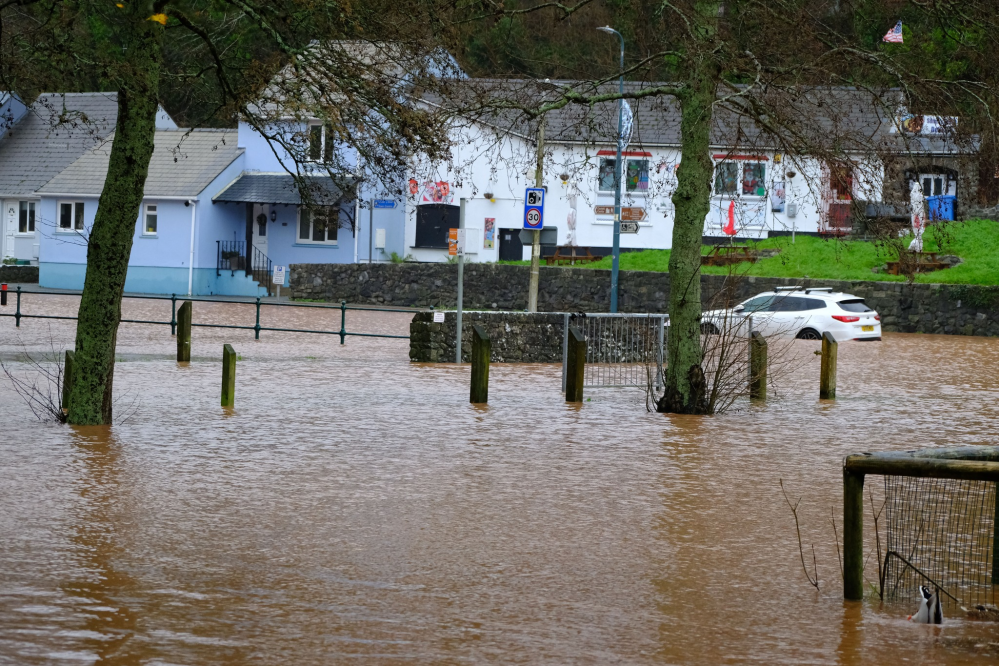Climate
Lifting of onshore wind ban will bring cheaper bills for consumers

RESPONDING to this week’s announcement by the Chancellor Rachel Reeves that the Government will reform the National Planning Policy Framework before the end of this month to end the de facto ban on onshore wind in England, RenewableUK’s Chief Executive Dan McGrail said: “Lifting the onshore wind ban in England was long overdue and we’re delighted that Labour has made this one of its first priorities in office. This shows that the new Government is determined to act fast to tackle some of the longstanding barriers which have held the UK back on developing vital new clean energy infrastructure.
“Public support for onshore wind remains sky-high throughout the UK at 78% according to the latest official polling, as billpayers know that new wind farms provide electricity at very low cost, as well as strengthening our energy security and tackling climate change. Polling also shows that most people want to see the planning system reformed, as they’re frustrated that an onshore wind farm proposal which is overwhelmingly popular in a local area can be stopped by just a handful of opponents.
“The onshore wind industry is committed to ensuring that communities are properly consulted about any proposals, including the wide range of economic benefits they will bring to local people. This process can take several years, including measures which help ensure that wildlife is protected, so it will be some time before brand new projects go ahead in England.
“Modern turbines are substantially more efficient and powerful than the turbines built in previous decades, so doubling the UK’s onshore wind capacity by 2030 won’t mean doubling the number of turbines in the UK. We can generate more power from fewer new turbines, and we can replace older turbines with far more powerful ones, making the most of our superb natural wind resources. Our research shows that delivering 30 gigawatts of onshore wind by the end of the decade would boost the economy by £45 billion and create 27,000 jobs”.
More details on the Government’s onshore wind announcement are available here.
Climate
Pembroke tidal flood defence work to continue to January

SIGNIFICANT issues with a part of Pembroke’s tidal barrage are not expected to be fully fixed before late January, councillors heard.
Pembroke councillors Aaron Carey and Jonathan Grimes submitted an urgent question heard at the December meeting of Pembrokeshire County Council, which said: “In light of the repeated flooding events across the county – including the recent overflow at Castle Pond and the acknowledgement by your own Coastal, Rivers & Drainage Team that the barrage tipping gate remains inoperable until mid-January can you explain what assessment has been made of the adequacy of our tidal outfall infrastructure in the face of current and projected future storm surges and sea-level rise?
“If no such assessment has yet been undertaken, will you commit now to commissioning an immediate structural and risk-capacity audit, with a report to full council within three months, and with proposals for funding any remedial works required — to avoid recurring damage and disruption to residents, highways, and public amenities?”
Responding to the urgent question, Cabinet Member for Residents Services Cllr Rhys Sinnett said a significant assessment of the Pembroke Tidal Barrage had already been undertaken over the past two years, with regular inspections.
He said “a comprehensive package of works” began in September which were due to be completed before Christmas but said there had been “significant issues” with the tipping gate hydraulic ram, with a significant overhaul now taking place, with reinstatement expected by late January.
He told members additional mitigation measures were now in place and, once works are completed, enhanced works will provide improved resilience and “long-term reliability,” with further reports due to come to Cabinet.
Cllr Carey and Cllr Grimes had also submitted a notice of motion saying: “That this council notes with concern the repeated and increasingly severe flooding experienced in our coastal, estuarial and river-fringe communities over recent weeks — in particular the flooding events affecting the Commons/Castle Pond area.
“That the council further notes that, according to correspondence from the Coastal, Rivers & Drainage Team Manager, the tipping gate at the barrage remains out of operation until mid-January due to mechanical issues; meanwhile high tide, heavy rain, wind-driven tidal surges and overspill at the sluice have combined to overwhelm the drainage/outfall infrastructure.
“That we recognise the current maintenance schedule (delayed ‘til after the summer season) and the justification given — but further that such planning failed to foresee the likelihood of severe winter storm and surge events, which climate change makes more frequent and more intense.
“That this council therefore calls on the Cabinet to commission an urgent review of:
- The adequacy of the current drainage/outfall and tidal-sluice infrastructure (barrage tipping gate, sluice/sluice-valve, flap valve, outfall capacity) for current and projected climate/tide conditions.
- The maintenance scheduling policy for coastal and estuarial flood-risk assets, with a view to ensuring critical maintenance is completed before winter high-tide / storm-surge season, rather than — as at present — being delayed until after summer for ‘recreational / biodiversity’ reasons.
“That, pending the outcome of the review, the council should allocate appropriate emergency capital funding to remediate the barrages / sluices / outfalls at risk of failure or blockage — to safeguard residents, properties, highways and public amenities from further flooding.
“That, further, this council resolves to publish a public flood-resilience plan for the county, identifying all coastal and river-fringe ‘hotspots,’ maintenance schedules, responsible teams, and a transparent timeline for upgrades or remedial works — so residents have clarity and confidence in flood prevention measures.”
The notice of motion itself will be considered by the council’s Cabinet at a later date.
Climate
Urgent calls for action on Pembroke Commons flooding

TWO PEMBROKESHIRE councillors have submitted an urgent call for action following recent heavy flooding in parts of Pembroke.
Pembroke councillors Aaron Carey and Jonathan Grimes have submitted an urgent notice of motion ahead of tomorrow’s December 12 meeting of Pembrokeshire County Council following heavy flooding in the town’s Commons and Castle Pond area.
The notice of motion covers six points.
“That this council notes with concern the repeated and increasingly severe flooding experienced in our coastal, estuarial and river-fringe communities over recent weeks — in particular the flooding events affecting the Commons/Castle Pond area.
“That the council further notes that, according to correspondence from the Coastal, Rivers & Drainage Team Manager, the tipping gate at the barrage remains out of operation until mid-January due to mechanical issues; meanwhile high tide, heavy rain, wind-driven tidal surges and overspill at the sluice have combined to overwhelm the drainage/outfall infrastructure.
“That we recognise the current maintenance schedule (delayed till after the summer season) and the justification given — but further that such planning failed to foresee the likelihood of severe winter storm and surge events, which climate change makes more frequent and more intense.
“That this council therefore calls on the Cabinet to commission an urgent review of:
- The adequacy of the current drainage/outfall and tidal-sluice infrastructure (barrage tipping gate, sluice/sluice-valve, flap valve, outfall capacity) for current and projected climate/tide conditions.
- The maintenance scheduling policy for coastal and estuarial flood-risk assets, with a view to ensuring critical maintenance is completed before winter high-tide / storm-surge season, rather than — as at present — being delayed until after summer for ‘recreational / biodiversity’ reasons.
“That, pending the outcome of the review, the council should allocate appropriate emergency capital funding to remediate the barrages / sluices / outfalls at risk of failure or blockage — to safeguard residents, properties, highways and public amenities from further flooding.
“That, further, this council resolves to publish a public flood-resilience plan for the county, identifying all coastal and river-fringe ‘hotspots,’ maintenance schedules, responsible teams, and a transparent timeline for upgrades or remedial works — so residents have clarity and confidence in flood prevention measures.”
The submission also includes a question for Cabinet Member Cllr Rhys Sinnett.
“In light of the repeated flooding events across the county – including the recent overflow at Castle Pond and the acknowledgement by your own Coastal, Rivers & Drainage Team that the barrage tipping gate remains inoperable until mid-January can you explain what assessment has been made of the adequacy of our tidal outfall infrastructure in the face of current and projected future storm surges and sea-level rise?
“If no such assessment has yet been undertaken, will you commit now to commissioning an immediate structural and risk-capacity audit, with a report to full council within three months, and with proposals for funding any remedial works required — to avoid recurring damage and disruption to residents, highways, and public amenities?”
A Pembrokeshire County Council spokesman has confirmed the 11th hour call will be heard by full council tomorrow.
Image: Martin Cavaney
Climate
UK marks 25 years since first offshore wind farm began generating power

Sector now powers millions of homes and supports 40,000 jobs
THE UK today (Dec 8) marks a significant milestone: 25 years since the country’s first offshore wind farm began generating electricity. Blyth Offshore Wind Farm, built off the Northumberland coast in 2000, consisted of just two turbines producing four megawatts of power — enough for three thousand homes — and laid the foundations for what has become one of the UK’s most important energy industries.
In the space of a single generation, offshore wind has grown into the UK’s largest source of clean electricity. In 2024 it provided more than thirty-four per cent of all renewable power and generated a record seventeen per cent of the UK’s electricity overall, totalling 48.5 terawatt hours. The current fleet has a combined capacity equivalent to five large nuclear power stations.
Across UK waters, 2,878 turbines are now in operation — ten floating and 2,868 fixed — with a total generating capacity of 16.1 gigawatts. That is enough to power more than sixteen million homes each year. Industry estimates suggest that, without this development, the UK would have had to burn an additional twenty million tonnes of gas over the past twenty-five years, producing more than sixty million tonnes of CO₂.
The sector’s growth has also reshaped the economy. Nearly two thousand companies now operate within the UK wind supply chain, including one hundred and sixty factories. Their combined activity is forecast to contribute £18.2bn to the UK economy over the next decade. Around forty thousand jobs are currently supported by offshore wind — a figure projected to rise to ninety-four thousand by 2030.
Construction is accelerating. More than 7.5GW of new offshore wind is already being built and is due to become fully operational within the next two years, with a further 22GW consented through to 2033.
‘Britain is once again leading the world in clean power’
Energy Minister Michael Shanks MP said: “Twenty-five years after the first offshore wind turbines began to turn, Britain is once again leading the world in clean homegrown power. Offshore wind is at the heart of our 2030 mission – helping us reduce our dependence on volatile fossil fuel markets, lower bills for good, and support one hundred thousand jobs by 2030.”
RenewableUK’s Deputy Chief Executive Jane Cooper said the sector’s progress had brought “jobs, investment, energy security, and environmental benefits in equal measure,” adding that next month’s clean power auction could secure a record amount of new offshore capacity. “A consistent pipeline of projects is vital to trigger new investment in factories and supply chain companies,” she said.
Julia Rose, Head of Offshore Wind at The Crown Estate, said the UK’s first 25 years demonstrated “the transformative power of collaboration and strategic vision,” noting that 45 operational wind farms are now in UK waters with a 95GW development pipeline. The Crown Estate plans to bring a further 20–30GW of new leasing opportunities to market by 2030.
Ed Daniels, CEO of Venterra Group, highlighted the role of the UK’s supply chain: “Offshore wind’s success has created tens of thousands of skilled jobs, rejuvenated coastal communities and established the UK as a global exporter of expertise. Continued investment is essential to deliver economic growth and energy security over the next twenty-five years.”
-

 Crime3 days ago
Crime3 days agoMilford Haven man jailed after drunken attack on partner and police officers
-

 News6 days ago
News6 days agoDyfed-Powys Police launch major investigation after triple fatal crash
-

 Crime3 days ago
Crime3 days agoTeenager charged following rape allegation at Saundersfoot nightclub
-

 Crime4 days ago
Crime4 days agoMan charged with months of coercive control and assaults
-

 Crime5 days ago
Crime5 days agoMan sent to Crown Court over historic indecent assault allegations
-

 Crime5 days ago
Crime5 days agoMilford Haven man admits multiple offences after A477 incident
-

 Crime4 days ago
Crime4 days agoWoman ‘terrified in own home’ after ex breaches court order
-

 Crime6 days ago
Crime6 days agoTrefin dog case ends in forfeiture order after protection notice breach





















